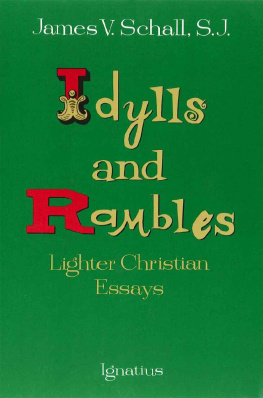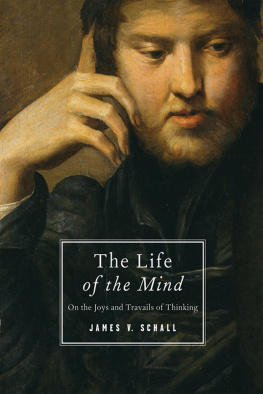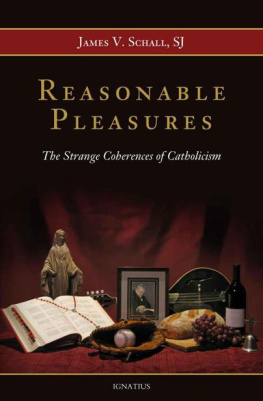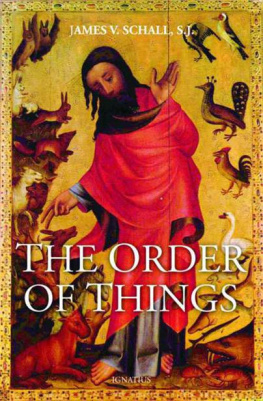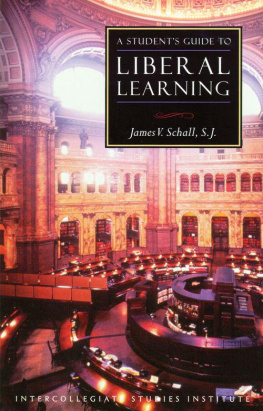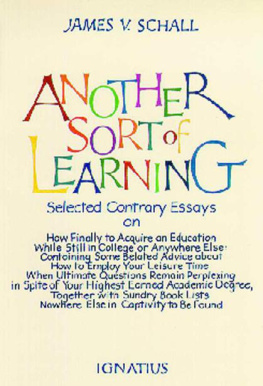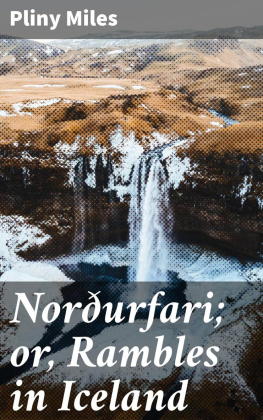James V. Schall - Idylls and Rambles: Lighter Christian Essays
Here you can read online James V. Schall - Idylls and Rambles: Lighter Christian Essays full text of the book (entire story) in english for free. Download pdf and epub, get meaning, cover and reviews about this ebook. year: 1994, publisher: Ignatius Press, genre: Art. Description of the work, (preface) as well as reviews are available. Best literature library LitArk.com created for fans of good reading and offers a wide selection of genres:
Romance novel
Science fiction
Adventure
Detective
Science
History
Home and family
Prose
Art
Politics
Computer
Non-fiction
Religion
Business
Children
Humor
Choose a favorite category and find really read worthwhile books. Enjoy immersion in the world of imagination, feel the emotions of the characters or learn something new for yourself, make an fascinating discovery.
- Book:Idylls and Rambles: Lighter Christian Essays
- Author:
- Publisher:Ignatius Press
- Genre:
- Year:1994
- Rating:3 / 5
- Favourites:Add to favourites
- Your mark:
- 60
- 1
- 2
- 3
- 4
- 5
Idylls and Rambles: Lighter Christian Essays: summary, description and annotation
We offer to read an annotation, description, summary or preface (depends on what the author of the book "Idylls and Rambles: Lighter Christian Essays" wrote himself). If you haven't found the necessary information about the book — write in the comments, we will try to find it.
Idylls and Rambles: Lighter Christian Essays — read online for free the complete book (whole text) full work
Below is the text of the book, divided by pages. System saving the place of the last page read, allows you to conveniently read the book "Idylls and Rambles: Lighter Christian Essays" online for free, without having to search again every time where you left off. Put a bookmark, and you can go to the page where you finished reading at any time.
Font size:
Interval:
Bookmark:
IDYLLS AND RAMBLES
JAMES V. SCHALL, SJ.
Lighter Christian Essays
IGNATIUS PRESS SAN FRANCISCO
Cover by Roxanne Mei Lum
1994 Ignatius Press, San Francisco
All rights reserved
ISBN 978-0-89870-456-3
Library of Congress number 93-78030
Printed in the United States of America
The precepts of Epicurus , who teaches us to endure what the Laws of the Universe make necessary, may silence but not content us. The dictates of Zeno , who commands us to look with indifference on external things, may dispose us to conceal our sorrow, but not assuage it. Real alleviation of the loss of friends, and rational tranquility in the prospect of our own dissolution, can be received only from the promises of him in whose hands are life and death, and from the assurance of another and better state, in which all tears will be wiped from the eyes, and the whole soul be filled with joy. Philosophy may infuse stubbornness, but Religion only can give patience.
Samuel Johnson, The Idler , Saturday, January 27, 1759
In the pictures of life I have never been so studious of novelty or surprise, as to depart wholly from all resemblance.... Some enlargement may be allowed to declamation, and some exaggeration to burlesque; but as they deviate farther from reality, they become less useful, because their lessons will fail of application. The mind of the reader is carried away from the contemplation of his own manners; he finds in himself no likeness to the phantom before him; and though he laughs or rages, is not reformed. The[se] essays professedly serious, if I have been able to execute my intentions, will be found exactly conformable to the precepts of Christianity.
Samuel Johnson, The Rambler , Final Number, Saturday, March 14, 1752
All of the essays in this book were originally published in my column Sense and Nonsense, in Crisis Magazine (1511 K Street NW, 525, Washington, D.C., 20005), except the following: Chapters 4, 5, 8, 10, 11, 15, 19, 26, 27, 29, 30, 34, 35, 37, 40, 42, 44, all of which appeared in The Monitor , the no longer published newspaper of the Archdiocese of San Francisco. Chapter 6 appeared in The Catholic Standard in Washington; Chapter 15 appeared in the Georgetown Guardian , a now defunct student magazine; Chapter 18 appeared in The Academy , a student newspaper at Georgetown University; Chapter 45 was a book review in Crisis , and Chapter 3 has not been published previously. The author wishes to thank these journals for use of essays included in this present book.
DIGRESSING TO OUR HEARTS CONTENT
Of all the forms of literature, from epic drama to Aristotles tightly reasoned philosophical lectures, from the novels of Jane Austen to the poetry of Dylan Thomas, the one I like best is the short essay. I have always loved the brief essay and have constantly, it seems, been writing one or another such essay all my life, even though the germ of my essay often began as a letter to someone. Indeed, collections of letters, as well as collections of essays, are also to me a joyous and wonderful part of our literature and of my habits of reading.
Thus, given a choice, say, between the Letters of Evelyn Waugh , which a friend once gave me, or the Habit of Being: The Letters of Flannery OConnor , which I bought down on Wisconsin Avenue in Georgetown, over against J. B. Mortons Selected Essays of Hilaire Belloc , which I have in two different editions; or W. E. Williams marvelous collection in the Penguin series A Book of English Essays , which contains one of my very favorite essayswhich I like to read out loudnamely, Hazlitts On Going a Journey; or Dorothy Sayers The Whimsical Christian , which was originally entitled, in the English edition, Christian Letters to a Post-Christian World , I choose all at once. And so I find myself happily reading five or six books at the same time.
Thus looking at my desk and shelves, I see in various stages of being read or reread a pile of essays and near-essays, like letters and sermons and accounts. I see Walker Percys Lost in the Cosmos: The Last Self-Help Book , the single volume Ignatius Press edition of John Henry Newmans Parochial and Plain Sermons, Orestes Brownson: Selected Political Essays , Madame de Sevignes Selected Letters , Albert Camus Lyrical and Critical Essays, Meister Eckhart: The Essential Sermons, Commentaries, Treatises, and Defense, Boswells Life of Johnson , Marion Montgomerys The Men I Have Chosen for Fathers (one of whom, amusingly, is Flannery OConnor). Next, I see Chestertons The Well and the Shallows and, to go no further, The Pickwick Papers , which if not exactly a book of essays is surely close enough.
That list is a little chaotic, some sceptic will object, a little impossible also. Well, that is true, but anyone who understands the real wonder of the essay will comprehend what I say. Essays are indeed rather chaotic and not a little impossible. In his introduction to the Belloc essays, J. B. Morton caught much of what I have in mind. Belloc, of course, was one of the greatest essayists in the language, as was his friend G. K. Chesterton. Morton wrote: The driving force of a good essay, that by which it lives and moves, is the character of its author. There are a hundred kinds of essay, because it is an intensely personal form of art, but whatever his method, the essayist discloses his own character. The essay is suffused with the risk and the delight that constitute life itself, the one perhaps because of the other.
A book of essays is a wonder of different moods and humors, including, as here, a few essays that are sad. I know there exist those pedants who demand in their books subsections and unified themes. But those readers who demand these orderly things do not really enjoy a book of precisely essays, a book that can surprise and amuse and confound us at every turn of the page. In a book of essays, we find place for fancy, for fate, for the flippant, for the fundamentals. We can talk of the universe or the corner drugstore, of God or the calf we saw on our cousins farm, of something our friend told us about waiting or our critic told us about our weight.
Likewise, in our essays, there is ample place for discussing our travels, places wherein we were happy or discontent. Too, in our essays, place is found for revealing our faith, place for our doubts, and place for what we do not know. Above all, there is room for wonder, for delight, for the excitement of discovery, and for our being simply astounded. We can talk in our essays of the death of our nephew and the loss of our eye, to see there some mystery we seek to fathom.
Morton continued of Belloc:
Nobody could think that any one of these essays had been written by another hand. For there are certain recurring idiosyncracies, in addition to the more important ingredients of his style, which label the work as his. He will use contrast most effectively; a swift transition from wisdom to foolery, from uproarious fun to the pensive, the tender, the melancholy. And since one thing suggests not another, but fifty others, he will digress to his hearts content.What the good collection of essays presupposes, then, is the mystery of our being, its depths of joy and of how our sadness relates to it.
Essays reveal what it means to accomplish something and for whom. For ultimately we think we are given our lives to know the truth of things and to live with those who stand in this same world as we do. We want to live in the same real world with those we love. In such a world we can, indeed, digress to our hearts content because everything that is falls under our gaze. The essay, unlike the treatise, does not neglect the little things in which everything takes its beginning.
Clearly, these present essays are touched by the spirit of Samuel Johnson, one of the most wondrous men in our literature: Idylls and Rambles these titles are from Johnson, These essays reflect too my own idylls and rambles. Here we find moments of reflective repose, walks, and travels that enable us to see our city and whether it is a lasting one.
Next pageFont size:
Interval:
Bookmark:
Similar books «Idylls and Rambles: Lighter Christian Essays»
Look at similar books to Idylls and Rambles: Lighter Christian Essays. We have selected literature similar in name and meaning in the hope of providing readers with more options to find new, interesting, not yet read works.
Discussion, reviews of the book Idylls and Rambles: Lighter Christian Essays and just readers' own opinions. Leave your comments, write what you think about the work, its meaning or the main characters. Specify what exactly you liked and what you didn't like, and why you think so.

